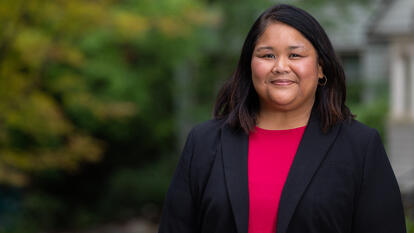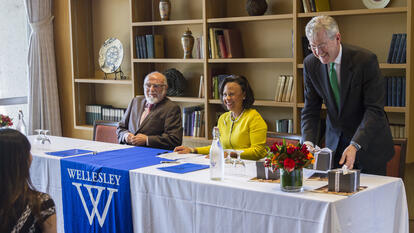From Past to Present, Wellesley Celebrates Black History Month

“Diversity at Wellesley goes back to its earliest years,” President Paula A. Johnson told the Wellesley Townsman in an article about the College’s history of African-American graduates and faculty to commemorate Black History Month. Johnson added, “Wellesley’s first Black graduate, Harriet Rice, graduated in 1887. (This was 10 years before the next Seven Sisters school had a Black graduate.) Wellesley has always been in the vanguard in the march for progress—and we will continue to be. It’s important to remember this commitment during Black History Month, but at Wellesley, it’s a commitment we live every day.”
The College is hosting a wide variety of Black History Month events with the theme “The Crisis in Black Education.” “Just like those alumnae who have gone before them, students of African descent continue to be at the forefront of efforts that center issues that impact the social, political, and economic landscape of communities of color both in the United States and abroad,” said Tracey Cameron, Wellesley’s assistant dean of intercultural education, in an email. “As such, Black History Month is not just an opportunity for the promotion of cultural awareness. Student groups also use the annual observance to engage in discourse around critical topics such as educational inequality, disparities within the criminal justice system, health inequities, and racial justice. I encourage our campus community to come out to the remaining Black History Month events as our student leaders do a phenomenal job in providing programming that is meaningful, timely, and culturally relevant.”
For the Townsman article, the writer visited the Wellesley College Archives to find stories about the College’s earliest Black graduates. Harriet Rice went on to become a medical doctor, and her career took her to France during World War I, where she served in French military hospitals. She was awarded the Medal of French Gratitude by the French government for her wartime service to soldiers. Rice recounted her experiences in an address to Wellesley College on Nov. 22, 1918.
The College’s second African-American graduate, Ella Lavinia Smith, was just one class year behind Rice, earning her degree in 1888. (The fire of 1914 destroyed records that would have pertained to Smith.)
The article highlighted several distinguished Black alumnae from the College’s earlier years, including a dean at Talladega College; a widely anthologized Harlem Renaissance poet; the founder of the Boston chapter of Delta Sigma Theta, a sorority for African-American women with a focus on civic engagement and service; and the nation’s first Black woman to be named a judge, Jane Bolin ’28.
The Townsman article also noted that the College hired its first Black faculty member in 1949. The writer interviewed Brenna Greer, Knafel Assistant Professor of Social Sciences and assistant professor of history, who shared her experiences as a faculty member of color. “I have enjoyed the most diverse teaching and learning settings of my academic career since I joined the Department of History at Wellesley College,” she said. “That I routinely get to teach courses about people of color to people of color represents progress that is gratifying to me on both the personal and professional level. In addition to any expertise I bring to my teaching, I hope I provide a model of ‘the possibilities’ for young women of color who matriculate at Wellesley. A central objective of my work as faculty at the college is to make academia more welcoming of women of color and their intelligence; my experience bears out that any learning endeavor is made richer by our inclusion.”
Student Gabrielle Taylor ’18 also reflected on her experience. “As a young Black woman interested in a career in government and law, I have had an incredible opportunity to benefit from all aspects of the Wellesley experience. Wellesley is a space full of diverse identities and ideas with a collective commitment to action,” she told the paper. “As a Wellesley student, the reasons I chose to matriculate here in 2014 make a bit more sense each and every day. I am excited to be a part of this great legacy and aspire to utilize my political science major to make a difference through my personal life and career, especially through encouraging and helping other young Black women achieve their dreams.”
Photo courtesy of the Wellesley College Archives. Pictured, from left: Ethel M. Caution-Davis 1912, Katherine Naomi Robinson ’22, Jane Bolin ’28.



